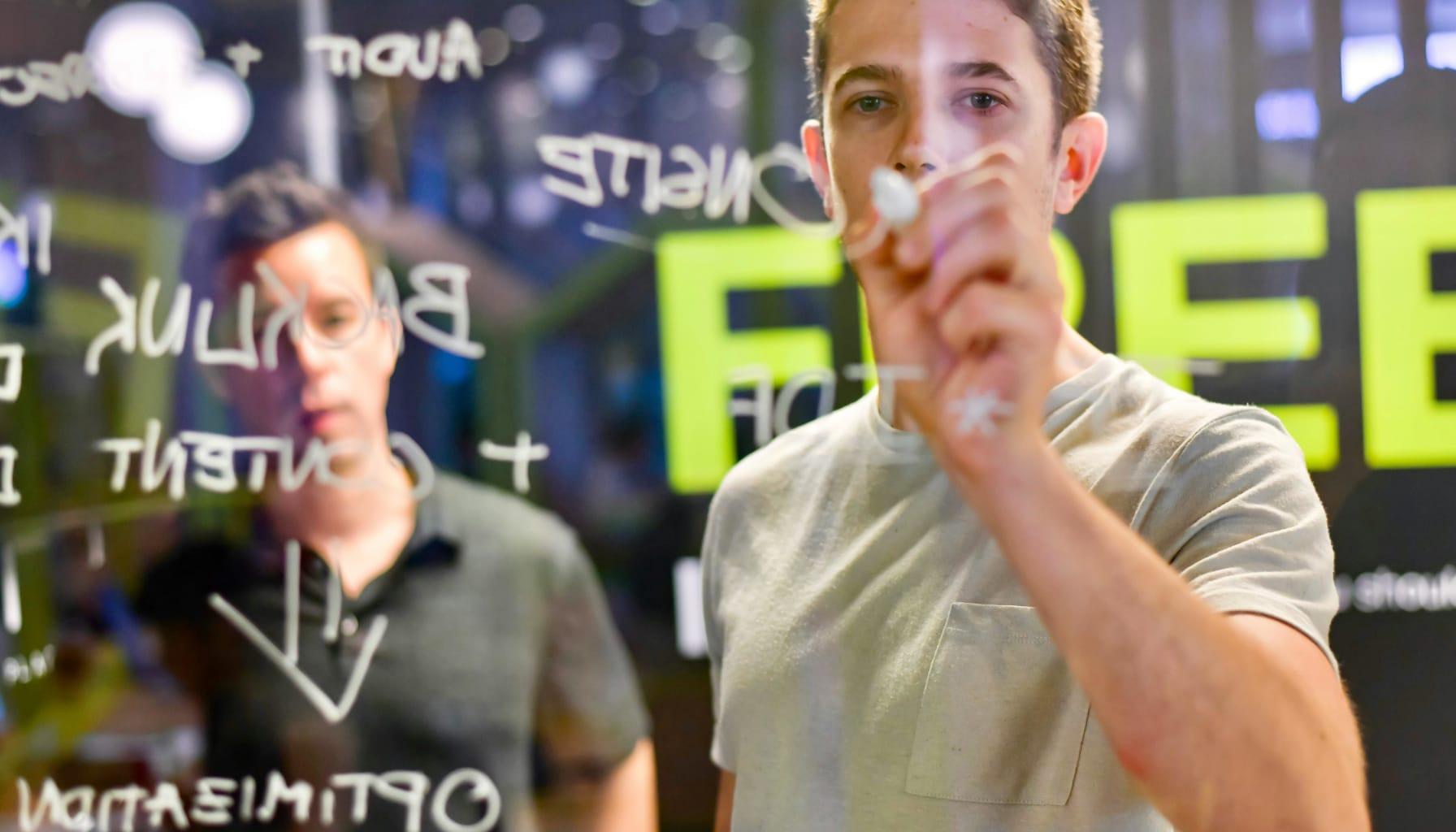Online marketing samples can be a goldmine of inspiration for businesses looking to elevate their digital presence. At Emplibot, we’ve curated a collection of standout case studies that showcase innovative strategies across various channels.
From viral social media campaigns to content marketing masterpieces, these examples demonstrate the power of creativity and data-driven approaches in online marketing. Get ready to explore how industry giants and clever startups alike have captivated audiences and achieved remarkable results.
Viral Social Media Campaigns That Broke the Internet
Social media campaigns have the power to captivate audiences and generate massive engagement when executed effectively. We analyzed three groundbreaking campaigns that not only achieved their marketing goals but also left a lasting impact on digital culture.
Nike’s #Breaking2: Pushing Human Limits
Nike’s #Breaking2 campaign aimed to break the two-hour marathon barrier (a feat previously thought impossible). The campaign centered around three elite runners attempting to run a marathon in under two hours. Nike live-streamed the entire event, which generated more than 19.8 million views (live and cached) of the attempt.
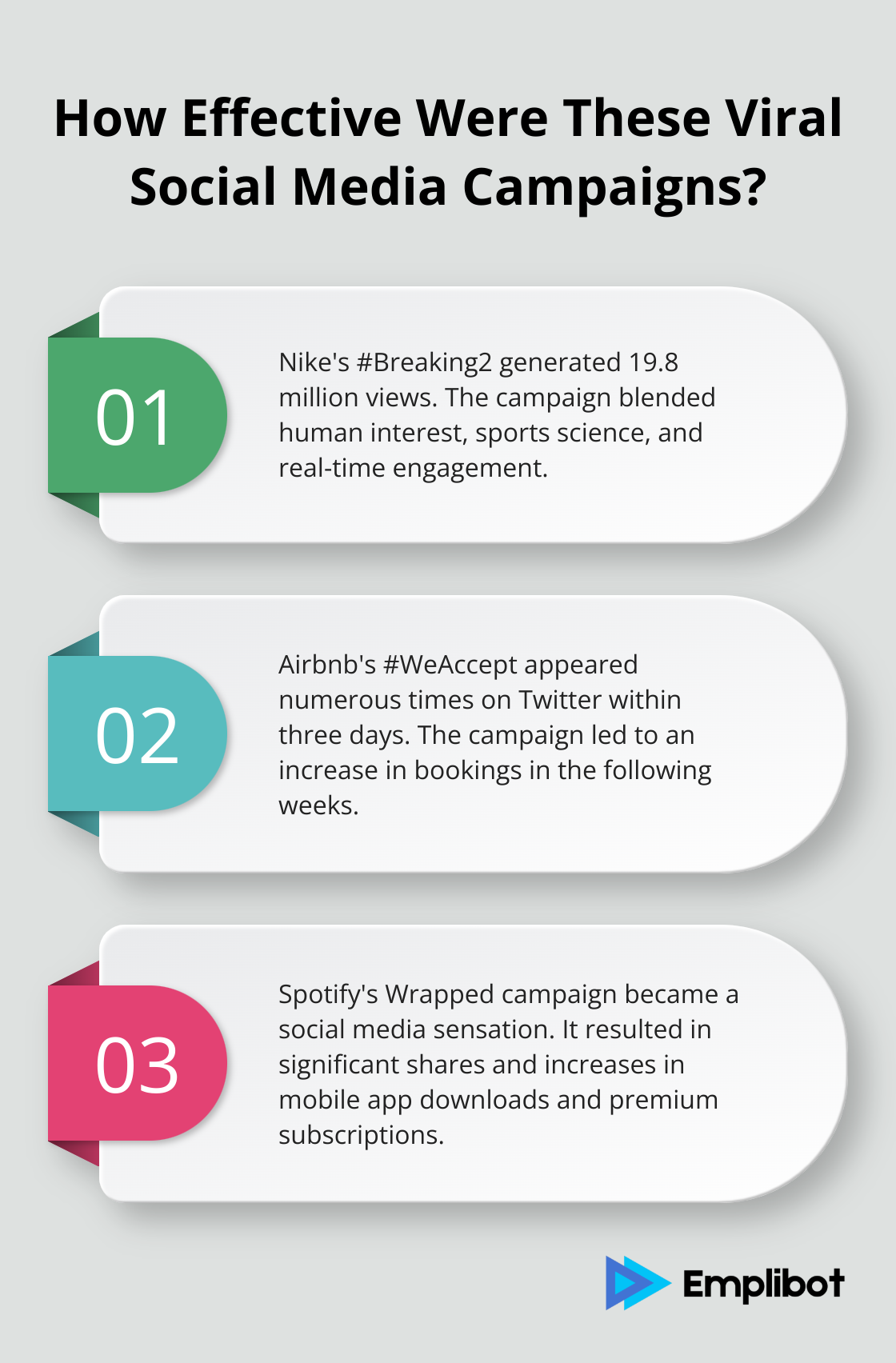
The campaign’s success stemmed from its blend of human interest, sports science, and real-time engagement. Nike created a dedicated microsite with detailed information about the runners, the science behind the attempt, and live updates. This multi-faceted approach resulted in significant social media engagement during the event.
To create a sense of urgency and participation among your audience, combine compelling storytelling with live events.
Airbnb’s #WeAccept: Taking a Stand
In response to the U.S. travel ban in 2017, Airbnb launched the #WeAccept campaign, showcasing its commitment to diversity and inclusion. The campaign featured a 30-second Super Bowl ad and a pledge to provide short-term housing to 100,000 people in need over five years.
The ad garnered significant views across social media platforms. Within the first three days, the campaign hashtag appeared numerous times on Twitter, generating millions of impressions. Airbnb saw an increase in bookings in the weeks following the campaign launch.
Aligning your brand with social causes can resonate deeply with audiences and lead to tangible business results.
Spotify’s Wrapped: Personalization at Scale
Spotify’s annual Wrapped campaign exemplifies data-driven personalization. The campaign provides users with a customized summary of their listening habits throughout the year, packaged in a shareable format.
The campaign has become a social media sensation, as people share and compare their Wrapped data with their friends and followers online. Spotify Wrapped generates significant shares on social media and has led to increases in mobile app downloads and premium subscriptions.
To encourage organic spread and user engagement, leverage user data to create personalized, shareable content.
These campaigns demonstrate the power of innovative thinking, emotional connection, and data-driven strategies in social media marketing. As we move forward, we’ll explore how companies have applied similar principles to content marketing, creating strategies that not only inform but also inspire and engage their audiences.
Content Marketing Strategies That Drive Results
Content marketing has become a cornerstone of successful digital marketing strategies. Leading brands leverage content to engage audiences, build authority, and drive conversions. Let’s explore three standout examples that showcase the power of strategic content creation and distribution.
HubSpot’s Inbound Marketing Revolution
HubSpot’s blog has become synonymous with inbound marketing excellence. Their approach focuses on creating valuable, educational content that addresses the pain points of their target audience. HubSpot’s blog covers a wide range of topics, from marketing and sales to customer service and business growth.
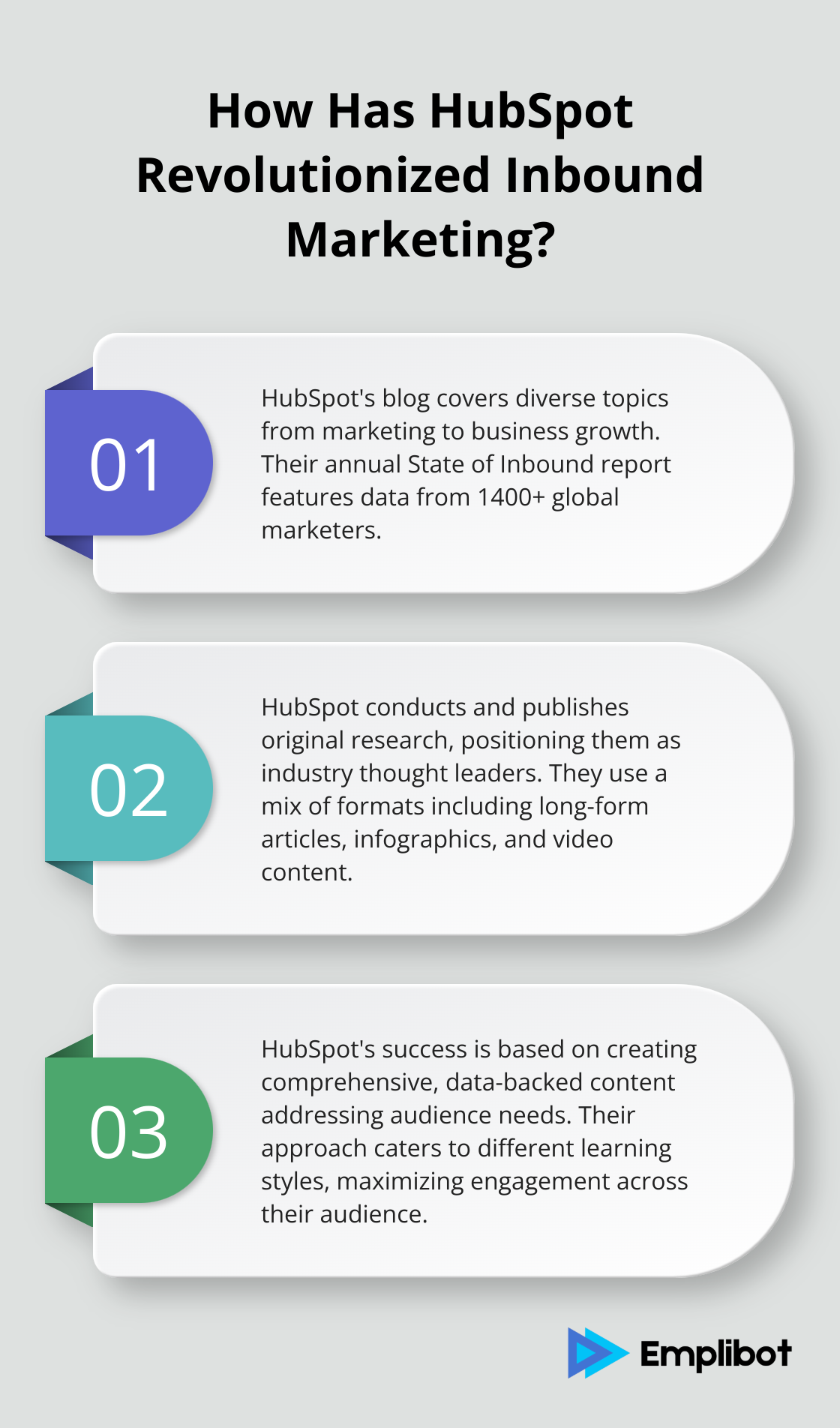
HubSpot sets itself apart through its commitment to data-driven content. They regularly conduct and publish original research, providing unique insights that position them as thought leaders in the industry. Their annual State of Inbound report has become a go-to resource for marketers worldwide, featuring data from 1400+ global marketers packed with insights for 2024, including thoughts from Litmus, Rock Content, and Search Engine Journal.
HubSpot’s content strategy also includes a mix of formats, including long-form articles, infographics, and video content. This diverse approach caters to different learning styles and preferences, maximizing engagement across their audience.
To replicate HubSpot’s success, create comprehensive, data-backed content that directly addresses your audience’s needs and challenges. Diversify your content formats and consistently deliver value to establish your brand as a trusted industry resource.
Red Bull’s Adrenaline-Fueled Content Hub
Red Bull has transcended its identity as an energy drink company to become a media powerhouse. Their content hub, Red Bull Media House, produces a wide array of high-quality content centered around extreme sports, adventure, and lifestyle.
Red Bull’s strategy revolves around creating content that embodies their brand values of pushing limits and living life to the fullest. They invest heavily in original video production, sponsoring athletes and events that align with their brand image.
One of Red Bull’s most successful content initiatives is their YouTube channel, which boasts over 10 million subscribers. Their videos, ranging from extreme sports documentaries to behind-the-scenes athlete profiles, consistently garner millions of views.
The key takeaway from Red Bull’s approach is the importance of aligning your content with your brand values and target audience’s interests. Create content that resonates on an emotional level to build a loyal community around your brand.
Coca-Cola’s Journey into Brand Storytelling
Coca-Cola’s Journey magazine represents a bold shift from traditional corporate websites to a dynamic, editorial-style content hub. Launched in 2012, Journey features a mix of brand stories, company news, and lifestyle content that goes beyond product promotion.
Journey’s unique focus on storytelling sets it apart. The platform showcases Coca-Cola’s global impact through human interest stories, sustainability initiatives, and cultural trends. This approach allows Coca-Cola to connect with consumers on a deeper level, fostering brand loyalty and positive associations.
Journey’s success is evident in its engagement metrics. The company re-launched its company website from a corporate website towards a digital magazine, aligning with its Content2020 strategy.
To apply Coca-Cola’s strategy to your content marketing efforts, focus on telling compelling stories that highlight your brand’s values and impact. Look beyond product features to showcase how your brand fits into your customers’ lives and the broader cultural landscape.
These case studies demonstrate that successful content marketing involves more than just creating blog posts or social media updates. It requires a comprehensive strategy that aligns with your brand values, addresses your audience’s needs, and consistently delivers value across multiple channels and formats.
As we transition to our next section, we’ll explore how companies have applied similar principles to email marketing, creating campaigns that not only inform but also inspire and engage their audiences on a personal level. Social media analytics play a crucial role in measuring the success of these strategies and informing future content decisions.
Email Marketing Mastery
Email marketing remains a powerhouse for customer engagement and conversion. We analyzed some of the most effective email campaigns to uncover strategies that drive results. Let’s explore how industry leaders leverage personalization, data-driven insights, and gamification to create email marketing campaigns that resonate with their audience and drive measurable outcomes.
Amazon’s Hyper-Personalized Recommendations
Amazon’s email marketing strategy sets the gold standard for personalization. Their product recommendation emails use a complex algorithm that considers past purchases, browsing history, and items in the cart. This level of personalization has contributed significantly to Amazon’s success, with recommendation algorithm driving 35% of its sales according to a McKinsey report.
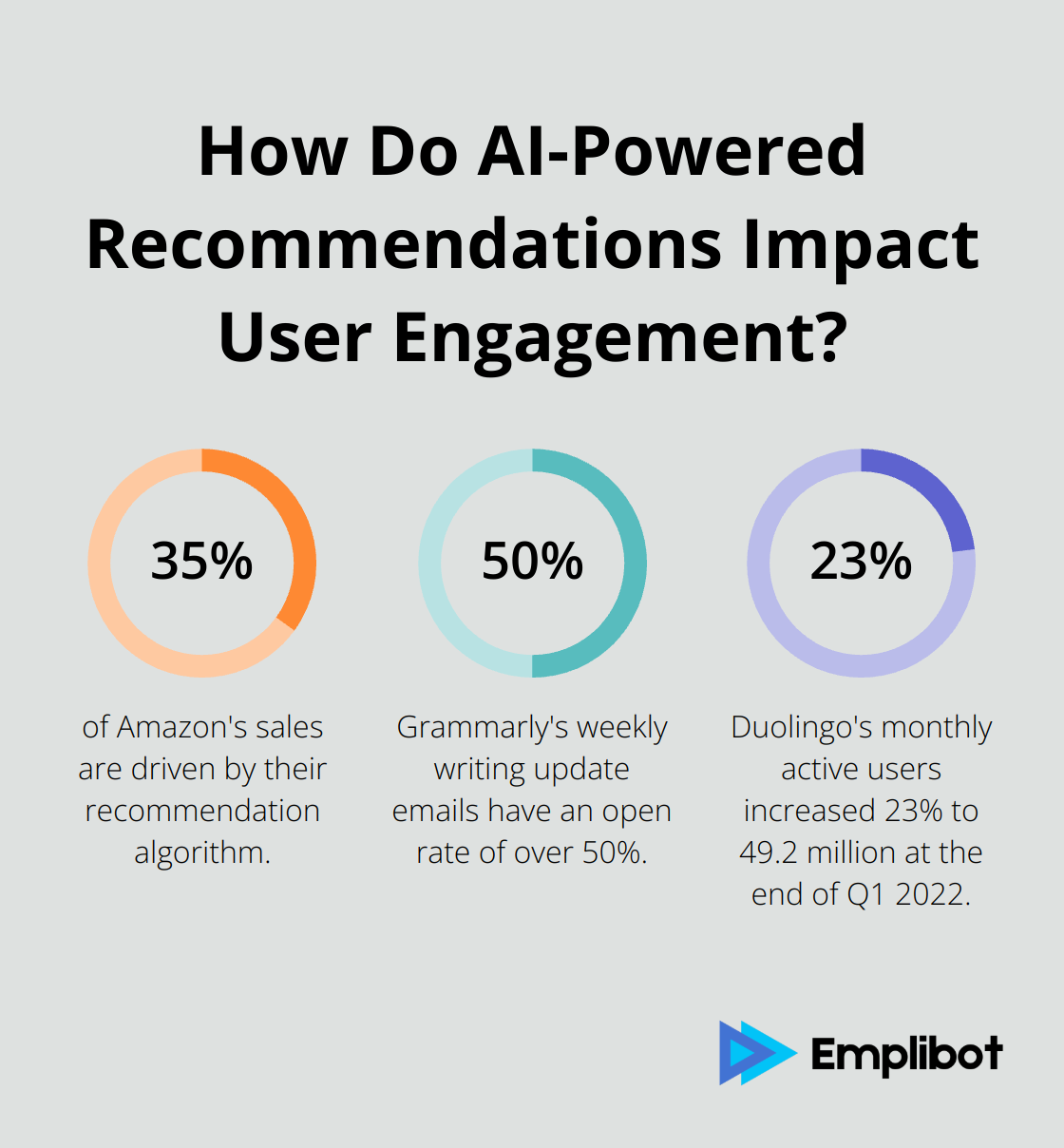
To implement a similar strategy:
- Segment your email list based on customer behavior and preferences
- Use data from your CRM and e-commerce platform to create tailored product suggestions
- A/B test different email layouts and recommendation algorithms to optimize your conversion rates
Grammarly’s Data-Driven Engagement
Grammarly’s weekly writing update emails showcase the power of data-driven content in email marketing. These emails provide users with personalized statistics about their writing performance, including vocabulary usage, accuracy, and productivity metrics. This approach not only engages users but also reminds them of the value they receive from the service.
Grammarly reports that these weekly emails have an open rate of over 50%, significantly higher than the industry average of 21.33% for software and web app companies (as reported by Mailchimp). The key to Grammarly’s success lies in providing actionable insights that users find valuable.
To replicate this strategy:
- Identify key metrics that matter to your users
- Create regular, data-driven updates
- Use this as an opportunity to showcase the value of your product or service while encouraging continued engagement
Duolingo’s Gamified Learning Reminders
Duolingo has mastered the art of using gamification in email marketing to boost user engagement. Their reminder emails tap into users’ competitive spirit and desire for achievement. These emails often feature the app’s mascot, Duo the owl, with playful messages that encourage users to maintain their learning streaks.
Duolingo’s approach has proven highly effective in reducing churn and increasing daily active users. At the end of Q1 2022, Duolingo’s monthly active users increased 23% to 49.2 million.
To incorporate gamification into your email marketing:
- Identify key behaviors you want to encourage
- Create a system of rewards or achievements
- Use playful language and visuals in your emails
- Highlight user progress and milestones
- Incorporate elements of friendly competition or community challenges
These successful email marketing campaigns demonstrate that personalization, data-driven insights, and gamification are powerful tools for engaging audiences and driving results. As you develop your email marketing strategy, focus on providing value to your subscribers through tailored content and experiences that resonate with their needs and interests.
Wrapping Up
Successful online marketing samples share key elements: personalization, storytelling, and data-driven strategies. These campaigns create emotional connections with their audience while delivering tangible value. The most impactful strategies leverage a mix of video, written content, and interactive elements to cater to diverse preferences and maximize reach.
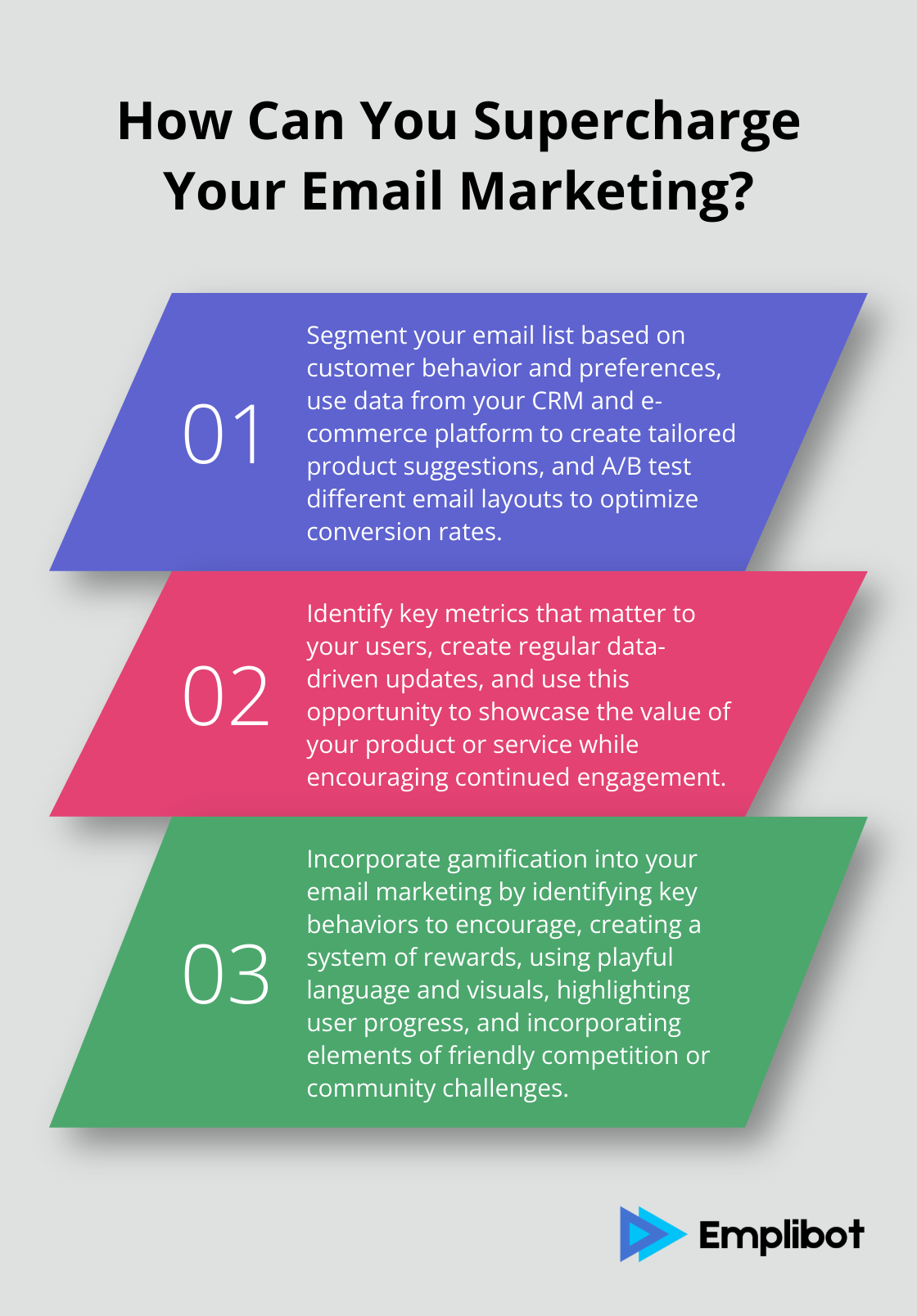
Effective online marketing requires a deep understanding of your audience. Data analytics provide insights into preferences, behaviors, and pain points. Create content that addresses these needs while aligning with your brand values. Experiment with different formats and channels to find what works best for your audience.
Online marketing evolves constantly, but engaging storytelling and data-driven decision-making remain essential. Tools like Emplibot can streamline content creation and distribution across multiple platforms. This allows you to maintain a strong online presence while focusing on strategy and creativity.
